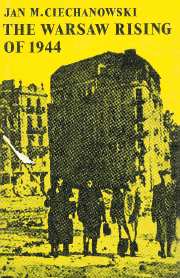Book contents
- Frontmatter
- Contents
- Abbreviations
- Acknowledgements
- Introduction
- Map
- 1 The Big Three and Poland: July 1943–July 1944
- 2 The Genesis of the Polish Resistance Movement
- 3 Attempts to Unify the Polish Resistance Movement
- 4 The Polish Grand Strategy, 1941–1943
- 5 The ‘Tempest’ Plan
- 6 The London Poles and ‘Tempest’
- 7 The ‘Tempest’ East of Warsaw
- 8 The Fate of Warsaw
- 9 Why Warsaw Rose
- 10 Warsaw and the Émigré Leaders
- Conclusions
- Bibliography
- Index
2 - The Genesis of the Polish Resistance Movement
Published online by Cambridge University Press: 04 August 2010
- Frontmatter
- Contents
- Abbreviations
- Acknowledgements
- Introduction
- Map
- 1 The Big Three and Poland: July 1943–July 1944
- 2 The Genesis of the Polish Resistance Movement
- 3 Attempts to Unify the Polish Resistance Movement
- 4 The Polish Grand Strategy, 1941–1943
- 5 The ‘Tempest’ Plan
- 6 The London Poles and ‘Tempest’
- 7 The ‘Tempest’ East of Warsaw
- 8 The Fate of Warsaw
- 9 Why Warsaw Rose
- 10 Warsaw and the Émigré Leaders
- Conclusions
- Bibliography
- Index
Summary
The first steps towards the formation of the Polish resistance movement, the nucleus of the future Home Army and the Polish Underground State whose leaders were primarily responsible for the out-break of the Warsaw Rising in August 1944, were taken in Warsaw in the last days of September 1939. On 27 September Lt-Gen J. Rommel, the Commander of the Polish troops defending Warsaw, empowered Maj-Gen M. Tokarzewski to create an underground military organisation, the Victory for Poland Service – Sluzba Zwyciestwu Polski, SZP.
General Tokarzewski was a professional soldier and had been a staunch follower of Marshal Pilsudski. He had, however, certain long-established contacts with the leaders of the Polish Socialist and Peasant Parties. Tokarzewski was a serving army General with certain political ambitions, in itself a quite common phenomenon among Polish pre-war military leaders.
During the First World War he served in Pilsudski's Legions and took part in the Russo-Polish War of 1920. In the last days of the campaign of September 1939 Gen Tokarzewski served as Gen Rommel's representative on the Defence of Warsaw Council, a civic advisory body attached to Gen Rommel's Staff. Many leading Polish politicians and civic leaders were also on this Council; some of them were to take part in the creation of the resistance movement. Tokarzewski used these contacts and his familiarity with Polish political life to improve his position as the leader of the underground movement.
He maintains that on 26 September 1939, he told Gen Rommel that he was ready to assume full responsibility for ‘organisation of armed resistance against the occupying powers and preparation of the country's moral and physical readiness to begin open warfare when conditions are favourable’.
- Type
- Chapter
- Information
- The Warsaw Rising of 1944 , pp. 69 - 83Publisher: Cambridge University PressPrint publication year: 1974

